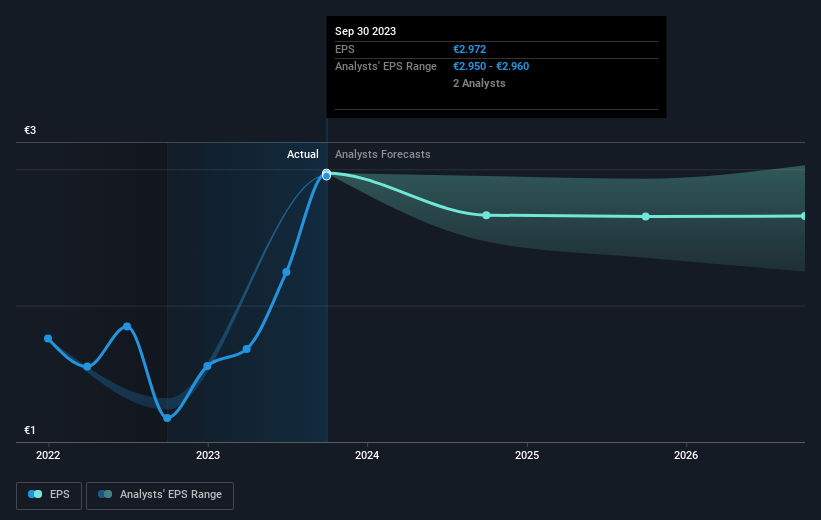Stock Analysis
- Austria
- /
- Electric Utilities
- /
- WBAG:EVN
Investors in EVN (VIE:EVN) have seen impressive returns of 111% over the past five years

EVN AG (VIE:EVN) shareholders might be concerned after seeing the share price drop 12% in the last quarter. On the bright side the returns have been quite good over the last half decade. Its return of 82% has certainly bested the market return!
So let's investigate and see if the longer term performance of the company has been in line with the underlying business' progress.
View our latest analysis for EVN
There is no denying that markets are sometimes efficient, but prices do not always reflect underlying business performance. By comparing earnings per share (EPS) and share price changes over time, we can get a feel for how investor attitudes to a company have morphed over time.
Over half a decade, EVN managed to grow its earnings per share at 16% a year. This EPS growth is higher than the 13% average annual increase in the share price. Therefore, it seems the market has become relatively pessimistic about the company. The reasonably low P/E ratio of 7.96 also suggests market apprehension.
You can see how EPS has changed over time in the image below (click on the chart to see the exact values).

It is of course excellent to see how EVN has grown profits over the years, but the future is more important for shareholders. Take a more thorough look at EVN's financial health with this free report on its balance sheet.
What About Dividends?
As well as measuring the share price return, investors should also consider the total shareholder return (TSR). Whereas the share price return only reflects the change in the share price, the TSR includes the value of dividends (assuming they were reinvested) and the benefit of any discounted capital raising or spin-off. So for companies that pay a generous dividend, the TSR is often a lot higher than the share price return. In the case of EVN, it has a TSR of 111% for the last 5 years. That exceeds its share price return that we previously mentioned. This is largely a result of its dividend payments!
A Different Perspective
It's nice to see that EVN shareholders have received a total shareholder return of 21% over the last year. That's including the dividend. That gain is better than the annual TSR over five years, which is 16%. Therefore it seems like sentiment around the company has been positive lately. Someone with an optimistic perspective could view the recent improvement in TSR as indicating that the business itself is getting better with time. While it is well worth considering the different impacts that market conditions can have on the share price, there are other factors that are even more important. Even so, be aware that EVN is showing 1 warning sign in our investment analysis , you should know about...
If you would prefer to check out another company -- one with potentially superior financials -- then do not miss this free list of companies that have proven they can grow earnings.
Please note, the market returns quoted in this article reflect the market weighted average returns of stocks that currently trade on Austrian exchanges.
Valuation is complex, but we're helping make it simple.
Find out whether EVN is potentially over or undervalued by checking out our comprehensive analysis, which includes fair value estimates, risks and warnings, dividends, insider transactions and financial health.
View the Free AnalysisHave feedback on this article? Concerned about the content? Get in touch with us directly. Alternatively, email editorial-team (at) simplywallst.com.
This article by Simply Wall St is general in nature. We provide commentary based on historical data and analyst forecasts only using an unbiased methodology and our articles are not intended to be financial advice. It does not constitute a recommendation to buy or sell any stock, and does not take account of your objectives, or your financial situation. We aim to bring you long-term focused analysis driven by fundamental data. Note that our analysis may not factor in the latest price-sensitive company announcements or qualitative material. Simply Wall St has no position in any stocks mentioned.
About WBAG:EVN
EVN
EVN AG provides energy and environmental services for private and business customers, and municipalities.
Solid track record with excellent balance sheet and pays a dividend.

